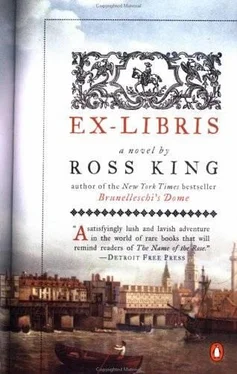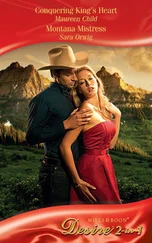She clutched the sheepskin more tightly about her knees and turned to see the bleary sun hoisting itself above the steep roof of the Powder Tower, into whose shadow the head of the caravan had crept. Their chariot stuck fast in the mire and had to be jemmied free. The horsemen cursed the delays. Then the tower's gates yawned wide, swung open by soldiers, giving on to snow-covered fields through which the trackway was muddier still, the water in the ruts deeper. But the caravan serpentined forward, shunting and sliding more swiftly over the undulations as if even the mules and oxen knew they were beyond the walls and therefore exposed to enemy guns. Drumfire still sounding from the direction of the castle, enfilades that grew fainter and more irregular as the procession drifted away and the last of the Bohemian rebels were captured or killed.
For the rest of the day the caravan followed the muddy road, passing through a succession of walled towns that looked to Emilia like shrunken versions of Prague, with their spired watch-towers, plague columns, small squares with town halls surmounted by weather-vanes and enormous clocks. Soldiers lurked in the gatehouses above which coats of arms had been inscribed in stone. The procession wound through the streets under the eyes of silent groups of townsfolk, then lurched through another gatehouse at the opposite end. After a few more hours the towns grew wider apart. Forests appeared, then thickened, and the snow on the roadsides deepened. Signs of human infringement disappeared except for a scattering of half-buried waymarks and a few distant castles crouched in valleys or outlined on hilltops against the sky.
Where was the caravan fleeing? All day rumours about their destination flew up and down its meandering length. Some claimed they were heading for Bautzen, though soon afterwards a rider appeared with the glum news that the Elector of Saxony-a boar-hunting drunkard, a Lutheran who hated Calvinists even more than Catholics-had overrun Lusatia and laid siege to the town. A rumour then arose that it would make its way to Brünn… until another rumour claimed that the Moravian Estates had withdrawn from the Bohemian confederacy. Another claimed that letters had been despatched to the Queen's cousin, the Duke of Brunswick-Wolfenbüttel, at one time her suitor, in which permission was asked for refuge in his dominions. But the Duke was dithering ungallantly in his reply, explaining how he must first consult his mother, who unfortunately was absent from Wolfenbüttel. So speculation seized on the cities of the Hansa League, although it was soon recalled how Frederick had borrowed from merchants in Lübeck and Bremen large sums of money, money that he had, alas, neglected to repay. A return to Heidelberg was rumoured next-a desperate choice, because the Palatinate, as everyone knew, was occupied by Spanish troops. Equally implausible was Transylvania, since although its Prince, Bethlen Gábor, was a good Calvinist, the country was perilously close to the lands of the Great Turk, whose janissaries were said to be buckling on their swords at that very minute. So finally Brandenburg reached the top of this shrinking list of possibilities, for Brandenburg's Elector, George William of Hohenzollern, was not only a good Calvinist but also the Queen's brother-in-law, a man who therefore could not possibly refuse her. But Brandenburg lay almost two hundred miles distant on the far side of the Giant Mountains.
At nightfall the caravan straggled into a small, multi-steepled town barely a dozen miles beyond the gates of Prague. It was divided by a river that flowed under fortified walls, then along the backs of a soldier-straight row of merchants' houses, its banks hedged by snow and its shallows paned with ice and covered in white spits. The Elbe, someone said. The procession lumbered as far as a deserted square, where it crowded to a halt, the animals exhausted and lame. Emilia caught sight of the Queen's carriage in the poor light, a massive affair, curtained and upholstered, that had been slung on sets of leather braces. Six powerful horses were required to haul it. The Queen sat inside, swaddled in a fur-lined lap robe and surrounded by bales of clothing and, it appeared, dozens of books. She, like Emilia, never embarked on even the shortest journey without an enormous supply of reading material. But she had almost embarked from Prague without one of the princes, the youngest, Rupert. He had been discovered at the last minute by the King's chamberlain, it was said, and thrust into a carriage. Now the three princes were riding behind their mother, Prince Rupert in the arms of his wet-nurse. As her chariot turned into the square Emilia could also see Sir Ambrose. He was mounted on a big Percheron, from whose back he patrolled the length of the procession like an overlord, barking commands in English and Bohemian as his mount threw up divots of mud and snow.
After much confusion, the ladies-in-waiting were ordered by the demoiselle d'honneur to a forlorn-looking inn, the Golden Unicorn, that stood in a bystreet and overlooked a Calvinist church. It was, they agreed, a sad decline from the days when travel with the Queen involved banquets and triumphal arches in every town, audiences with nobles, troops of burghers appearing to doff their hats and bend their knees.
Emilia was placed in a tiny room whose bare floor was littered with rat droppings. She shivered for a long time on the narrow pallet, exhausted but unable to sleep. Someone was weeping next door, a low, choking sound, spasmodic and laborious. From outside in the street came the occasional erratic chime of the church bell and the crunching of feet in the snow. After an hour she rose from the bed, swaddled in blankets, and sat before the begrimed casement. The sky had blown clear and a fat moon arisen. The unpacking of the convoy was not yet finished. She could see Sir Ambrose in the middle of the square, leaning on a riding-stick and giving orders to the soldiers as they distributed fodder among the horses and oxen. She narrowed her eyes and studied his broad form. The man was a riddle. He had not spoken so much as a word to her since leaving Prague. He had offered no explanations either for his presence in the library or for their perilous flight through the streets of the Old Town. There was no sign that anything had passed between them, or even that he remembered her. She wondered if she ought to be offended or relieved.
What was his plan? With nothing to read on the journey and little to see through the quarter-lights except expanses of rock and snow, she had had hours to puzzle over the parchment in the library and the three horsemen, even about the imponderable Sir Ambrose himself. Various plots had begun to suggest themselves. Throughout the spring and summer, she knew, dozens of strangers had arrived in Prague Castle. These were not the usual students and scholars, those humble pilgrims who travelled on mail-coaches or mangy mules. No, these had been visitors of a different sort, often liveried or else bearing sealed letters of introduction from dukes and bishops in every corner of the Empire, and from France, Spain and Italy as well. 'Turkey-buzzards', Vilém had called them. Rumours were abuzz, he explained, that in order to finance his armies King Frederick was preparing to sell the treasures of the Spanish Rooms-hundreds of paintings, clocks, cabinets, even the telescopes and astrolabes made by Galileo himself. A 500-page catalogue had been drawn up in secret by the Bohemian nobility and then distributed among the potentates of Europe. Their agents arrived in Prague Castle soon afterwards, one step ahead of their marauding armies.
Of course, a good many books from the library had been included in the enormous catalogue. Frederick was planning to sell them like a costermonger hawking cabbages in the street, Vilém bitterly complained. And naturally there were as many buyers for the books as for everything else, especially for the most valuable ones, including the Golden Books from Constantinople. In Rome, Cardinal Baronius-the man who oversaw the gargantuan task of cataloguing the Vatican Library-was said to have interested the Pope in the collection. It must have been a difficult task, Vilém sneered, for Paul V was a vulgar man, a detestable philistine-the same man who had censored Galileo in 1616 and placed the work of Copernicus on the Index . But apparently His Holiness was now interested in acquiring not only the treasures of Prague but also Frederick's patrimony, the books in the Bibliotheca Palatina-the finest collection of Protestant learning in the world.
Читать дальше












